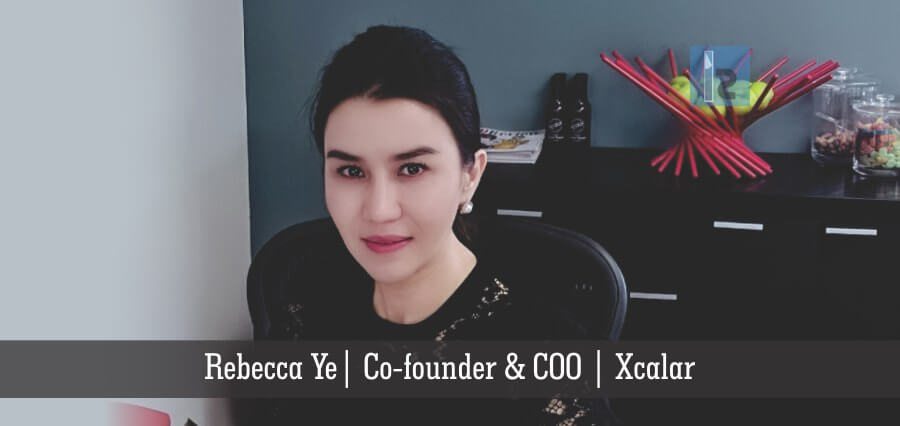Based in Silicon Valley, Xcalar is a big data tech startup that has embraced diversity. It has employees from more than a dozen countries, a 35/65 female-to-male ratio, and multiple women in leadership positions. One of these leaders, co-founder and COO, Rebecca Ye, gave her thoughts on women’s empowerment:
“[Society is] starting to recognize [that] empowering women is the key to economic growth, political stability, and social transformation.”
Rebecca believes that the movement has gained “momentum”, and pointed to California’s decision last year to legally require corporate boards of directors to include women as proof. She also cited how both market research and academia have linked women in leadership roles and corporate success. With world leaders, experts, and scholars alike all working together to put the ideas of women’s empowerment into action, Rebecca is confident that the momentum will only continue to build.
Rebecca’s father was a professor in philosophy and comparative literature. Her uncle, on the other hand, was an engineering professor. “So you can see who had more influence on me”, she jokes. “I’ve always had a deep respect for how technology has changed the way we work and live.” But while enrolling in an engineering college was a matter of course for Rebecca, the same can not be said for other women: historically, women have lower participation rates in university engineering and computer science classes. Rebecca believes that the onus is on tech companies to change this trend by “making a deliberate effort to encourage women”. And as the statistics at the beginning of this article indicate, she practices what she preaches.
“At Xcalar, we encourage women to be in leadership roles where there is a good fit. Xcalar has benefited greatly from their perspectives and contributions.”
After graduating with a master’s degree in engineering, Rebecca entered the workforce as a programmer. Then after earning a MBA degree, she moved into product marketing, then into sales and business development, and at last into operations. She credits her success to her tenacity and her thirst for learning, adding that “learning is no longer limited to schools, it’s a constant theme in life.” Change has become constant, paradoxically enough, and only those who are willing to experiment can make it. That is why Rebecca believes diversity is so important, as it is the meeting of people with different genders, backgrounds, ethnicities, origins, and skill sets that produces new ideas. But at the same time, it takes a patient, open mind to steer a diverse group through debates, discussions, collaborations, experimentations, and inevitable mistakes. And it is here that Rebecca thinks women have an important role to play, as they “tend to be effective communicators with empathy.”
“I believe [that] as society progresses, more women will have opportunities in senior leadership positions to make a real impact in the workplace and our community.”
As a next generation platform for data processing applications and ML, Xcalar accelerates the ability of companies to derive business insights from big data. After two patents and four years of development, the platform is now capable of scaling to hundreds of nodes and thousands of users, handling data pipelines, virtual data warehousing, advanced ad-hoc analysis, and more. As COO, Rebecca is spearheading the company’s “phase of hyper growth”, building out revenue, customers, and employees. This is an exciting time for the company and Rebecca is optimistic that her diverse team will be able to meet any upcoming challenges. As a female executive of a fast-growing company, she is eager to be a part of the momentum propelling the women’s empowerment movement forward, and hopes that her example will inspire other women.
“I’m very fortunate to be in Silicon Valley, working in a tech startup where conventions are constantly being challenged, and forward thinking is encouraged as the new norm. We’re leading by example to make this a reality for many more women around the globe.”
With that all said, Rebecca does not believe empowerment to be a blank check. It “needs to be exercised with great discipline and respect.” To avoid unnecessary arguments, she recommends observing boundaries and seeking to understand before being understood. Rebecca encourages teams to identify owners, define end goals, and to truly understand and appreciate other perspectives and strengths. Only then will a team be able to build the best possible solution.
Rebecca is optimistic about the role technology can play in improving lives, and expects IT, cloud, and mobile technologies to make an even stronger impact in the decades to come. She foresees big data combining with AI to provide a “wide range of new solutions and services to drive productivity and collaboration” in entertainment, life science, retail, hospitality, financial services, and many other fields. Indeed, she believes that we will soon enter “an era where computers will be capable of doing a lot more of what knowledge workers used to do.” But she is certain that computers will not replace humanity. Rather, these future solutions and services will free knowledge workers from repetitive busywork, and augment the human ability to find patterns and predict outcomes.
“Our challenge is to be disciplined in how to apply these technologies in a moral and sensible way. I am always encouraging my team to continue to take risks, to question the status quo and to, when in doubt, choose action.”


